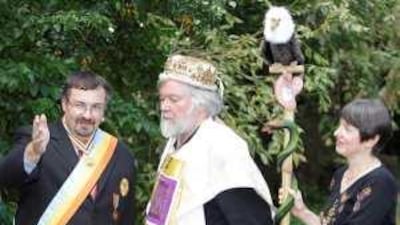Australian conference is a right royal day for self-declared nations DANGAR ISLAND, AUSTRALIA // What their nations lacked in size and recognition, they made up for in titles. Princess Paula from the Snake Hill Principality and His Imperial Majesty George II of the Empire of Atlantium were among the star attractions at the world's first academic conference on micronations held on a small island in Australia.
Such self-declared polities often exist only on paper, on the internet or in the minds of their creators, yet while official recognition is almost non-existent, a thriving, if loosely affiliated, movement has developed in Australia over the past 40 years. "They are incredibly diverse and they don't always get on with each other," said Dr Judy Lattas from the department of sociology at Macquarie University. "There are people who do it more as a hobby and there are people who are very politically serious."
Dr Lattas estimates there are 30 microstates across Australia, some of which have claimed to have become autonomous territories that do not pay taxes. Some have their own currency, passports and national anthems. "There is a glee in being able to stick it to the authorities. They like the daring of it," Dr Lattas said in an interview during the conference on Dangar Island, located 50km from Sydney.
"It is not an anti-tax movement in the way that a lot of the Americans are. Australians in general haven't got a big problem with tax, even government regulation really. It is when they feel personally cheated in an individual case that it becomes something bigger," Dr Lattas said. The Snake Hill Principality was established in 2003 following a messy court battle in which its founders felt betrayed by Australia's legal and political system.
"We realised we were on our own, felt we had no other recourse but to secede and we did that by using international law," said Paula Jensen, 42, a former structural engineer, who has assumed the title of Princess Paula of Snake Hill, which has its main headquarters 260km north-west of Sydney, neat the town of Mudgee in New South Wales. "We have citizens, we have a parliament, we have a territory which is about the same size as Monaco," Ms Jensen said. "We're not terrorists, we're not out to control the continent. We just would like to be left alone to have our own little country."
Ms Jensen administers a constitutional monarchy that oversees a multicultural micronation that has among its 200 citizens people of Italian, Polish and Irish descent, while Snake Hill's elected prime minister is a Greek-Cypriot. The organisation has received several default notices for unpaid tax and other state levies, although the fight for formal recognition has been boosted over the years by Christmas cards from the Libyan leader, Muammer Qadafi, as well as correspondence from senior officials in Brazil, Colombia and Kyrgyzstan.
Australia has been a hotbed of micronationalism since the Principality of Hutt River was set up near Perth in 1970, beginning a rebellious tradition that has continued to flourish. Other microstates were borne as acts of political dissent. The Republic of Lavalon was established by Jason McKerra, a welfare worker, following the Australian government's decision to storm a Norwegian freighter, which had rescued hundreds of mainly Afghan asylum-seekers in the Indian Ocean in 2001.
"A lot of it can be attributed to the fact that Australia was founded as a convict society and as a consequence of that there is a natural distrust of authority within the Australian psyche," said George Cruickshank, also known as His Imperial Majesty George II of the Empire of Atlantium, a global sovereignty advocacy group which has 1,300 members in 100 countries with official envoys in Brazil and India.
"Atlantium has never pretended to be a secessionist state," said Mr Cruickshank, a keynote speaker at the conference. "We view ourselves as a model future world government. The territory that we have acquired as our capital in rural New South Wales we view as an extra-territorial province. It is still part of Australia but we administer it as though it were an embassy or a consular residence." @Email:foreign.desk@thenational.ae

